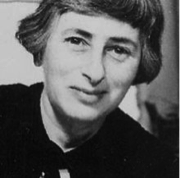 Babette Deutsch was an American poet, literary critic and novelist. She was also a renowned translator of Russian literature into English, her most notable work being the translation of Pushkin’s Eugene Onegin along with a number of poems written by Boris Pasternak. Her own poetry received critical attention for the first time in 1919 when she published a collection called Banners, the title poem of which was a celebration of the beginning of the 1917 Russian Revolution.
Babette Deutsch was an American poet, literary critic and novelist. She was also a renowned translator of Russian literature into English, her most notable work being the translation of Pushkin’s Eugene Onegin along with a number of poems written by Boris Pasternak. Her own poetry received critical attention for the first time in 1919 when she published a collection called Banners, the title poem of which was a celebration of the beginning of the 1917 Russian Revolution.
Babette was born on the 22nd September 1895 in New York City, her parents being of German/Jewish descent. She lived for most of her long life in the city, with occasional forays on overseas trips. She attended and then matriculated from the Ethical Culture School before going on to Barnard College where she found she had a talent for writing poetry. While studying at Barnard she earned a BA and had some of her work published in the North American Review and the New Republic.
She was a prolific writer throughout her life and her poetry was aligned to the Imagist movement. Many of her poems were short but lyrical ekphrastic responses to paintings and other pieces of visual art that caught her attention. Her work ran to ten collections of poetry although two of these were anthologies of her own work: Collected Poems 1919–1962 was published in 1963 and The Collected Poems of Babette Deutsch followed in 1969.
As well as poetry Deutsch wrote four novels and produced six volumes of children’s literature. She was a student of poetry and published four books on the subject. She edited Poems of Samuel Taylor Coleridge in 1967 along with a number of anthologies of Russian and German poetry. She was a fluent German speaker and translated much of the work of Rilke into English. She was perhaps inspired to study Russian literature after marrying Avrahm Yarmolinsky in 1921 who was also a writer as well as being the head of the Slavonic section at the New York public library for over thirty years.
Much of her work was centred on Jewish themes and culture, and the miracle of life. Her poem Quivers contains the following lines:

Deutsch featured biblical themes, imagism and Japanese haiku in her second collection of poetry, Honey Out of a Rock, which was published in 1928.
In addition to being a prolific writer she was also a well-respected teacher, filling appointments at the New School for Social Research from 1933 to 1935 and Columbia University between 1944 and 1971. She also served on a number of committees dedicated to the advancement of literature, was chancellor at the Academy of American Poets and a consultant to the Library of Congress. She won many awards for her work including an honorary doctorate in literature from Columbia University.
There is no doubt that Babette Deutsch was a significant figure in Jewish American literature throughout the 20th century. She used her work to pay homage to Jewish heritage, raging against the tragedy of the Holocaust and the destruction of her people by an evil regime. At the same time she tried to make some sense of what had happened, as evidenced in the following lines from another of her poems:

Babette Deutsch died on November 13, 1982 aged 87.

